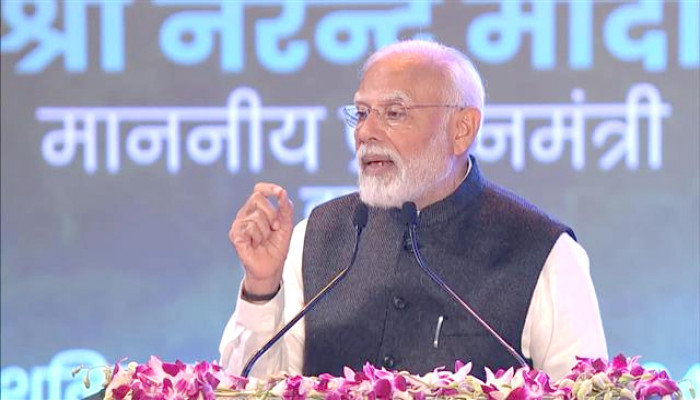PM Modi launches world's largest grain storage scheme
- In Reports
- 10:42 PM, Feb 24, 2024
- Myind Staff
On Saturday, Prime Minister Narendra Modi inaugurated the world’s largest grain storage scheme in the cooperative sector. This ambitious plan involves a substantial investment exceeding Rs 1.25 lakh crore and includes the opening of 11 warehouses in primary agricultural credit societies across 11 states. Under the scheme, thousands of warehouses and godowns will be constructed across the country.
Additionally, he laid the groundwork for the establishment of warehouses and other agricultural infrastructure in 500 additional PACS. Additionally, he inaugurated a nationwide project aimed at computerizing 18,000 PACS.
"Today we have launched the world's largest storage scheme for our farmers. Under this, thousands of warehouses and godowns will be constructed across the country," said Modi as quoted by news agency PTI.
The Prime Minister criticised previous governments for neglecting the development of storage infrastructure in the country, attributing significant losses to farmers as a consequence.
"Previous governments never paid due attention to this problem. But today through PACS, this problem is being addressed. Under the world's largest food grain storage programme, 700 lakh tonne storage capacity will be created in the next five years. On this initiative more than ₹1.25 lakh crore will be spent," said PM Modi.
The Prime Minister highlighted that farmers would now have the capability to store their harvest in the newly established godowns and warehouses. This would enable them to secure institutional credit against their stored produce and sell their goods when market prices are favorable.
Modi urged cooperative organisations to work towards reducing imports of food items, including edible oils and pulses, and also fertilizers. He suggested that cooperatives should make a list of items that India imports and plan an action to produce or manufacture them locally.
"Our fuel import has to be reduced. In ethanol, we are working in a big way. Ethanol production has increased significantly," Modi said.
The Prime Minister discussed the government's initiatives over the past decade to foster the growth of the cooperative sector in alignment with its vision of "Sahakar se Samridhi" (Prosperity through Cooperation). He specifically emphasized the establishment of a dedicated ministry for the cooperative sector as a significant step. Through a separate ministry, efforts are being made to strengthen cooperatives in the country, he said.
Modi also highlighted the importance of bringing transparency in the election system in cooperatives, saying this would encourage more participation of people in the cooperative movement.
He underscored the amendments made to the Multi-State Cooperative Societies Act and the ongoing process of computerizing Primary Agricultural Credit Societies (PACS).
Modi referred to the farmer producer organisations (FPOs), he said small farmers are becoming entrepreneurs and even exporting their produce.
"We had set a target of establishing 10,000 FPOs. We have already set up 8,000 FPOs. Their success is being discussed at the global level now. Fishery and animal husbandry sectors are also benefiting from the cooperatives," he said.
The Prime Minister outlined the goal of establishing 2 lakh Primary Agricultural Credit Societies (PACS) in the coming five years, with a particular emphasis on the fishery and allied farm sectors, where the maximum number of PACS is envisioned to be implemented.
The scheme aims to develop storage capacity capable of accommodating 100% of India's grain production. The plan aims to effectively integrate Primary Agricultural Credit Societies (PACS) godowns into the food grain supply chain, with a cooperative effort involving the National Bank for Agriculture and Rural Development (NABARD) and led by the National Cooperative Development Corporation (NCDC).
The implementation of this initiative involves the convergence of multiple existing schemes, including the Agriculture Infrastructure Fund (AIF) and Agriculture Marketing Infrastructure (AMI). This approach enables the participating Primary Agricultural Credit Societies (PACS) to access subsidies and interest subvention benefits for their infrastructure development projects.
Image source: Nagaland Page







Comments